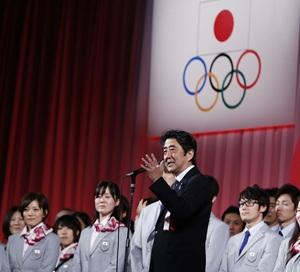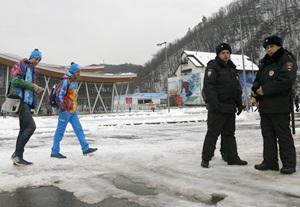 Japanese Prime Minister Shinzo Abe may attend the opening ceremony for the Sochi Winter Olympics, but China has ruled out any formal meeting with President Xi Jinping whose attendance at the Games has already been confirmed.
Japanese Prime Minister Shinzo Abe may attend the opening ceremony for the Sochi Winter Olympics, but China has ruled out any formal meeting with President Xi Jinping whose attendance at the Games has already been confirmed.
Japan's ties with China have recently deteriorated due to a series of disputes, including Abe's visit to a shrine seen as a symbol of Japanese militarism - a visit that also infuriated South Korea, which like China also suffered from Japan's wartime aggression.
Xi will visit Russia from February 6 to 8 to attend the opening ceremony, China said on Monday in an apparent show of support for Russian President Vladimir Putin, who has staked his political future on the success of the Games.
Chief cabinet secretary Yoshihide Suga said last week that plans were being made for an Abe trip to Sochi to attend the opening ceremony, but that nothing had been finalised. The Olympics run from February 7 to 23.
Chinese Deputy Foreign Minister Cheng Guoping, speaking in Beijing on Tuesday, said that Xi had no plans to meet any Japanese leader in Sochi.
Ties have been strained over a dispute involving a group of uninhabited islands in the East China Sea and Abe's visit to the controversial Yasukuni Shrine, where war criminals are honoured along with war dead. The visit prompted concern from key Tokyo ally the United States
"If there is a situation (where there is an encounter between the two), the Chinese leader will sternly explain China's position," Cheng said.
Abe has made ties with Russia a priority of his tenure despite a long-standing dispute over several islands seized by Russia in the waning days of World War Two that has prevented the two nations from signing a peace treaty.
Foreign ministers of the two nations met in Tokyo last November and agreed to hold a vice ministerial-level meeting early this year to work towards the resolution of the island dispute and the signing of a peace treaty.
The opening ceremony will coincide with Northern Territories Day in Japan when Tokyo habitually calls for the return of the islands. Abe will attend a commemorative event before leaving for Russia, Japanese media have reported.
US President Barack Obama and German President Joachim Gauck have both said they will not visit Russia for the Games. Other officials, such as Finland's sports minister Paavo Arhinmaki, have cited Russia's human rights record as a reason for their boycott of the opening ceremony.
China has 'complete faith' in Sochi Winter Olympics security
China is confident that Russia will be able to guarantee security at next month's Winter Olympics in Sochi, officials said on Tuesday.
 To ease fears over possible breaches of security, President Vladimir Putin has ordered safety measures beefed up nationwide after 34 people were killed last month in bombings in Volgograd, another city in southern Russia.
To ease fears over possible breaches of security, President Vladimir Putin has ordered safety measures beefed up nationwide after 34 people were killed last month in bombings in Volgograd, another city in southern Russia.
While about 37,000 Russian personnel are providing security in the Sochi area, the United States in particular has expressed concern about the security situation.
China, though, is completely confident, Deputy Foreign Minister Cheng Guoping told reporters in Beijing.
"China has complete faith that Russia has the ability to ensure the security of the Sochi Winter Olympics. I believe these games will be successful with this tight security," Cheng said.
"China has been in close touch and has coordinated with Russia about this."
Chinese President Xi Jinping is attending the opening ceremony of the February 7-23 Winter Olympics in a show of support for Putin, who has staked his political prestige on the success of the Games.
Xi's decision to attend is a positive development for Putin, after U.S. President Barack Obama and his German counterpart Joachim Gauck both said they would not travel to Russia for the Games.
China is not a traditional winter sports powerhouse, winning only five gold medals at the 2010 Games in Vancouver, and deputy sports minister Yang Shu'an said China was only a "middle" country in this field.
China has won a total of nine gold medals at winter Games, compared with 201 at the summer Olympics.
"Of the 98 competitions at Sochi, about one-third of them we don't yet do in China. There is a problem of imbalance and a lack of popularity for winter sports in China," Yang added.
China's four-time Olympic short-track speedskating champion Wang Meng is likely to miss the Games after fracturing her ankle and Yang said that while the team did not have a gold medal haul target they would do their best to bring back medals.
"We don't have a figure for the number of medals we want to win. We just want to encourage our athletes to work hard and go all out to get them," he added.
"Doubtless, with Wang Meng injuring herself there will be a certain effect on our success."
Russia's human rights record has also come under close scrutiny with Finland's Sports Minister Paavo Arhinmaki boycotting the opening ceremony over the country's "limitations in the freedom of speech or repressing of sexual minorities".
Yang said China was very strict on adhering to the principles of the Olympic charter that politics had no place in the competition.
"What is important for us at the Sochi Games is to properly manage and organise our own athletes," Yang said. "We won't get involved in other things."
The Sochi Games are the 22nd Winter Olympics and will run from February 7-23.
The Chinese cities of Beijing and Zhangjiakou are jointly bidding for the 2022 Winter Olympics, though China has so far given few details and doubts have been cast by northern China's persistent smog crisis.
Yang said China was serious about the bid, and about cleaning up the air.
"The whole Chinese government is dedicated to cleaning up the environment, and that's not just for the Winter Olympics bid," he added.
Images: Japan's Prime Minister Shinzo Abe attends a send-off ceremony for the Japanese team's departure to the Sochi 2014 Winter Olympic Games and Police officers stand guard outside a train station in Krasnaya Polyana near Sochi
Photographs: Yuya Shino/Reuters and Alexander Demianchuk/Reuters












 © 2025
© 2025